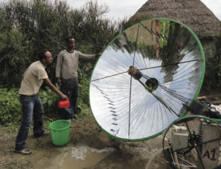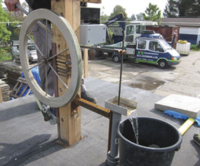Solar-Powered Pumps for Improved Irrigation
Overview
|
Innovator |
||
|
Project |
||
|
Collaborators |
PRACTICA Foundation (Netherlands) | |
|
Location Applied |
Globally, more than 800 million farmers manually lift and haul water to irrigate their farmland. These farmers can drastically decrease their labor and expand their irrigable area by employing motorized pumps. Currently, the most accessible and affordable pump solutions are four to seven horsepower pumps powered by increasingly expensive fossil fuels. Consequently, many farmers are either unable to provide sufficient irrigation to their crops, and/or must allocate a sufficient portion of their income to environmentally-hazardous fossil fuels.[1]
Clean Energy Solution
To increase agricultural productivity, incomes, and livelihoods of smallholder farmers, iDE and its partners have developed a Clean Irrigation Solution that will provide smallholder farmers across the developing world the opportunity to mechanize their farming with zero carbon emissions. The system uses the Sunflower pump, an efficient, versatile, and cost-effective piston pump powered by a PV panel, which is coupled with iDE’s affordable, ultra-low pressure drip irrigation kit to maximize the agricultural output and value of each drop of water pumped.
Technology development is only one component of bringing the Sunflower pump to scale. iDE has identified five key factors needed to bring a Clean Irrigation Solution to scale:
- Appropriate Technology—iDE is working with the PRACTICA Foundation to develop a low-cost solar pump called the Sunflower pump.
- Viable Business Plan—iDE is partnering with Futurepump, a private company that will be responsible for the manufacturing and global distribution of the Sunflower pump.
- Accompanying Finance Model—iDE is identifying finance models to bring down the high upfront costs that currently make the Sunflower pump cost-prohibitive to smallholder farmers.
- Established Supply Chain—iDE is identifying national and sub-national level retailers to bring the Sunflower pump to different markets. iDE is working through its last-mile distribution network to provide installation and repair services.
- Marketing and Educational Resources—iDE is developing training manuals for field technicians and using demonstration plots to convey the benefits of the Sunflower pump for smallholder farmers.[1]
Recently, field testing of pumps has been started in Nepal: read more in the Powering Agriculture April 2016 Newsletter.
Locations: Honduras, Nepal, and Zambia
Impact
iDE’s goal is to compete with fossil fuel-powered pumps currently on the market, and ultimately shift famers’ preference toward clean energy pumping solutions. This consumer shift would have a remarkable environmental and socio-economic effect on agrarian communities. Using the CIS instead of a fossil fuel engine can reduce annual carbon emissions by as much as 250 kilograms per 1,000 irrigated square meters.[1]
Organization
iDE has over 30 years’ experience in developing appropriate agricultural products and engaging the private sector to supply these products to smallholder farmers, improving long-standing agricultural practices. This project is implemented in partnership with PRACTICA Foundation (a Dutch organization that has a focus on the commercial application of technology in the field of water and energy), and Futurepump Ltd.(a UK manufacturer of efficient irrigation pumps).[1]
Progress Update
By the end of the Powering Agriculture Award in June 2017, iDE had pioneered a new product category of solar pump. iDE worked with its partners, Futurepump and the PRACTICA Foundation, on the development and refinement of the Sunflower pump–now branded as the SF1–a highly efficient piston pump powered by an 80-watt PV panel. This latest version of the pump, featuring a 40% reduction in weight and volume while retaining efficiency, was tested at sites in Kenya and began shipping to Nepal and Zambia. iDE installed 1,064 pumps for testing at 48 active field sites; 80 in Honduras, Zambia, Nepal. An additional 4 pumps have been installed in the USA, Bangladesh, Burkina Faso, and Cambodia, which shows iDE’s progress towards global distribution. As a result of these field tests, iDE and its partners have gone through five design iterations of the pump. In addition, 80 pumps have been sold to iDE’s private sector partners for sales to end users in Zambia and Nepal.[1]
Further Information
- Water and Energy for Food (WE4F) portal on energypedia
- Toolbox on Solar Powered Irrigation Systems
- Powering Agriculture Homepage, Winners/ Innovators
- Powering Agriculture: An Energy Grand Challenge for Development
- Powering Agriculture Newsletters
- Powering Agriculture Homepage, iDE
- iDE Homepage
- Honduras Energy Situation
- Nepal Energy Situation
- Zambia Energy Situation






















